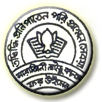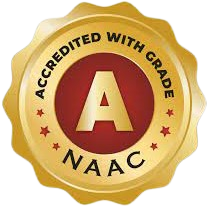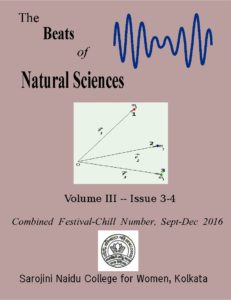ISSN 2348 – 7615
Volume III, Issue 3-4
Combined Festival-Chill Number (Sept-Dec), 2016
From the Desk of the Editors:
We would like to apologise for the delays in the publishing process in recent times. This time we are going to publish Issue No. 3 and 4 of Beats, Vol. 3, combined together; as we failed to publish the received papers of one issue in time, due to certain technical problems. In this combined issue, six articles are appearing distributed in four different categories; two research reports, two review articles, one in innovative idea of research and teaching methodology and rest belongs to the interface — science, environment and society. We hope this issue will attract attention from our readers …
Download pdf: From the Desk of the Editors
Brief reports of original research works:
- Frequency of β (Beta Thalassaemia) Trait and Haemaglobin E (HbE) Trait: Case Study in a Thalassaemia Carrier Detection Camp in Gurudas College, West Bengal, India
Mitu De [dropdown_box expand_text=”Abstract” show_more=”View” show_less=”Hide” start=”hide”]Hemoglobinopathies include an array of disorders caused due to mutations in the alpha and beta chain of hemoglobin. Thalassaemia is an inherited blood disorder and is a significant public health alarm in India with many individuals not even knowing that they are carriers of this dreaded haemoglobin disorders. The South-east Asia region, which includes India, Thailand and Indonesia accounts for 50% of world carriers. Beta (β)-thalassaemia is the commonest single-gene disorder in the Indian population with an overall prevalence of 3-4%. This health burden 1emphasizes the need for prenatal diagnosis and carrier status detection to contain the disease and reduce the load of the mutant alleles in the gene pool. A free carrier detection camp was organized by Gurudas College and conducted Thalassaemia Control Unit, (State Thalassaemia Control Programme, West Bengal), Haematology Department, Calcutta School of Tropical Medicine, Kolkata. This important event was in collaboration with the Inner Wheel Club of Cossipore, District 329. Frequency of β (Beta Thalassaemia) trait and HbE trait in a Thalassaemia carrier detection camp in Gurudas College, Kolkata 54 was within the national prevalence range.[/dropdown_box] Download Full Paper
- Impact of the Grandchild’s Autism Diagnosis on the Grandparent: A Case Study
Mitu De, Naureen Huda, Vandana Kumar, Ranjana Chakrabarty, Chandrani Chakraborty and Indrani Basu [dropdown_box expand_text=”Abstract” show_more=”View” show_less=”Hide” start=”hide”]A grandparent can give unconditional love and companionship to a grandchild with disability(s) as the relationship develops over the years and help provide balance within the entire family system. Autism is a complex and often devastating disorder for both the individual affected and his or her family. The emotional, functional, and financial support that a grandparent could provide may help buffer the increased stress having a child with ASD places on the family system. In this case study in-person interviews were conducted with grandparents of children newly diagnosed with autism, participating in the parent training program for the first time. This investigation shows that most grandparents are willing to change their mindsets and help their grandchild with autism as best as possible.[/dropdown_box] Download Full Paper
Review on current frontiers or historical milestones:
- Green Leafhopper (GLH), Nephotettix Virescens (Distant) and Rice Tungro Disease (RTD)
Santi Ranjan Dey [dropdown_box expand_text=”Abstract” show_more=”View” show_less=”Hide” start=”hide”]The rice green leafhoppers (GLH) are one of the most devastating rice pests throughout the rice growing areas of Asia. Both nymphs and adults of the green leafhopper feed on rice by sucking the plant sap and plugging the vascular bundles with stylet sheaths. The onset of the tungro disease depends on the presence of a susceptible host, a virus source, and the vector. It is associated with two viruses—rice tungro bacilliform virus (RTBV) and rice tungro spherical virus (RTSV). Both viruses are transmitted by the green leafhopper (GLH) Nephotettix virescens (Distant). A direct correlation between vector population and disease incidence has been observed at different locations.[/dropdown_box] Download Full Paper
- Obesity – One of the Leading Cause of Type II Diabetes Mellitus: A Review Work
Nivedita Koley [dropdown_box expand_text=”Abstract” show_more=”View” show_less=”Hide” start=”hide”]Vigorous food intake indicates to obesity. Obesity is strongly associated with insulin resistance, when coupled with relative insulin deficiency, leads to type II diabetes mellitus. Children and adolescents with type II diabetes mellitus may experience the microvascular and macrovascular complications of this disease at younger ages than individuals who develop diabetes in adulthood, including atherosclerotic cardiovascular disease, stroke, myocardial infarction, and sudden death, renal insufficiency and chronic renal failure, limb-threatening neuropathy and vasculopathy, and retinopathy leading to blindness. Health care professionals are advised to perform the appropriate screening to the obese person at risk for type II diabetes mellitus diagnose the condition as early as possible. [/dropdown_box] Download Full Paper
Innovative idea on research and teaching methodology:
- Reduced Mass – An Alternative View
Jayeeta Chowdhury and Arup Roy [dropdown_box expand_text=”Abstract” show_more=”View” show_less=”Hide” start=”hide”]Concept of reduced mass is very useful in the study of two-particle systems under mutual interaction. When one particle is being observed from the position of the other, it is the reduced mass of the system, which is in motion under mutual forces. We have pointed out that the special form of the equation of motion under such a condition is nothing but the effect of pseudo force. Using the concept of pseudo force we have extended this idea to many-particle systems. We have constructed a general equation using which one can easily find the acceleration of any particle observed by any other within an isolated many-particle system. [/dropdown_box] Download Full Paper
The interface — science, environment and society:
- Role of Health Information Sources in Breast Cancer Awareness
Swati Ghosh [dropdown_box expand_text=”Abstract” show_more=”View” show_less=”Hide” start=”hide”]Information is one of the vital resources for the development of a civilized society. It plays significant role in every sphere of human life, may be in education, research and development; business or industry, health sector and Government affairs etc. Information is a fundamental issue for future decision making. In the health sector, role of health information is also crucial as it serves in the decision making process in all aspects.
This health information services assist the people to meet their information need relating to healthcare in day-to-day activity. In fact, human existence is characterized by notion of information search. This search of information will lead in achieving a better position in the life. This information need creates a new search term i.e. “Information Sources”.
The paper proceeds with an understanding of different types of health information sources along with their role in breast cancer awareness. The paper has three major parts; the first part deals with different types of information sources; second part consists of specific health information sources regarding breast cancer. The third part deals with the attitude regarding health information sources among the breast cancer patients, doctors in five Medical College Hospitals in Kolkata.
[/dropdown_box]Download Full Paper
Contact Informations :
| Publisher: Principal, SAROJINI NAIDU COLLEGE FOR WOMEN |
Address: SAROJINI NAIDU COLLEGE FOR WOMEN,30, Jessore Road, Dumdum, Kolkata 700028, India | Phone No.: +91-33-2559 2583 email: info@sncwgs.ac.in |
| Editors: Dr. Sonali Saha Dr. Soma Aditya Bandyopadhyay Dr. Chaitali Biswas |
Address: SAROJINI NAIDU COLLEGE FOR WOMEN,30, Jessore Road, Dumdum, Kolkata 700028, India | Phone No.: +91-33-2559 2583 email:editors.bns@sncwgs.ac.in |
 Pay Your Fees
Pay Your Fees 



